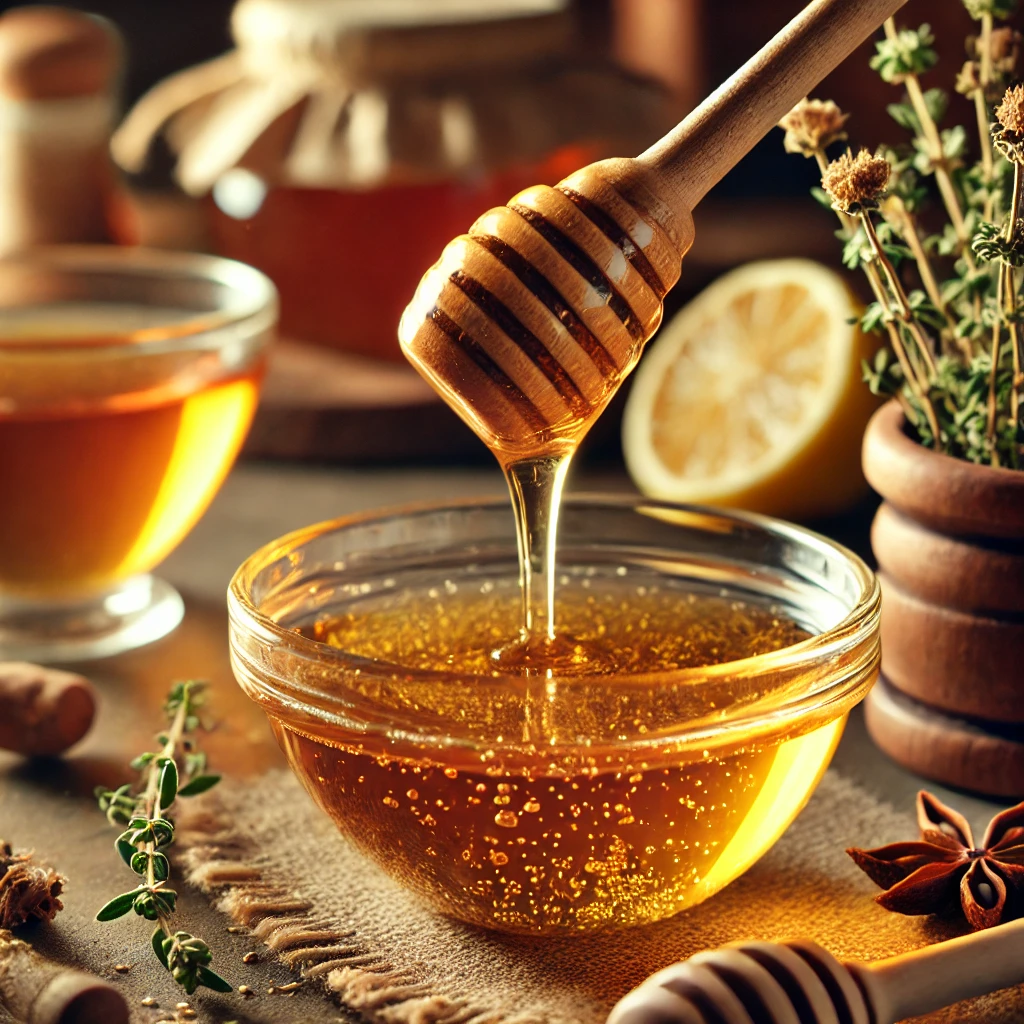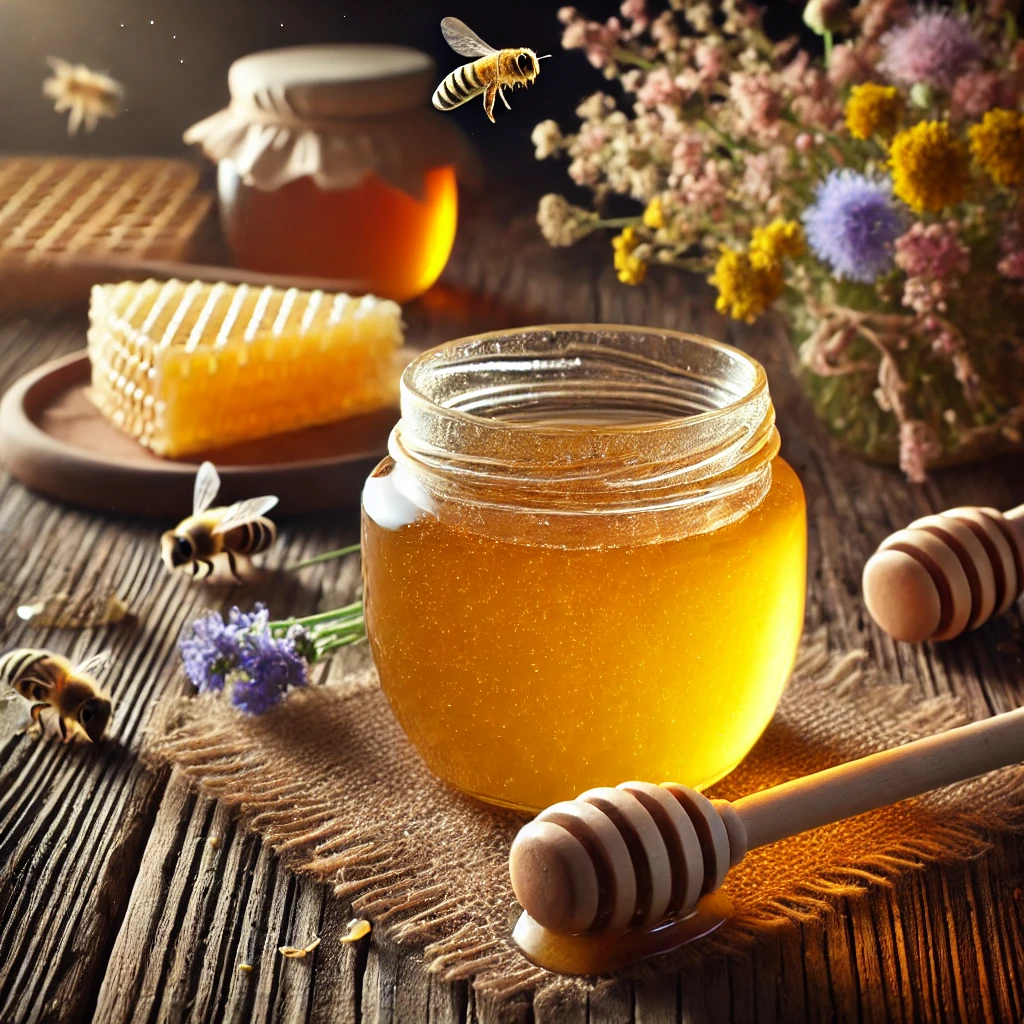
Raw honey isn’t just a sweet treat from nature – it’s an ancient remedy, a potent superfood, and a versatile staple that deserves a permanent place in your kitchen. While processed, supermarket-grade honey often lacks nutritional value, raw honey retains its powerful enzymes, antioxidants, and antibacterial properties. It has been used in everything from natural healing to skincare and digestive health.
This guide explores the scientifically supported health benefits of raw honey, how it compares to processed honey, its nutritional profile, and how to use it safely and effectively in your everyday life.
What Is Raw Honey?
Raw honey is honey that has not been pasteurized or heavily filtered. It is taken directly from the hive, strained lightly to remove debris, and then packaged. This means it retains pollen, enzymes, antioxidants, vitamins, and minerals – unlike the clear, uniform product lining most grocery store shelves.
Here’s a simple comparison table:
| Feature | Raw Honey | Processed Honey |
|---|---|---|
| Heat-treated | No | Yes |
| Pollen present | Yes | Rarely |
| Enzymes intact | Yes | Often destroyed |
| Antioxidant levels | High | Reduced |
| Texture | Cloudy, may crystallize | Clear and syrupy |
| Shelf life | Long | Long |
If you’re eating honey for health, raw is the way to go. Let’s break down the many ways it benefits your body and mind.
1. Antibacterial and Antimicrobial Power
Raw honey contains hydrogen peroxide, a natural antiseptic. Its low moisture and acidity levels create an environment that kills or inhibits harmful bacteria and fungi. This makes it incredibly useful for:
- Treating minor cuts and wounds
- Soothing sore throats
- Managing skin infections
In fact, Manuka honey, a type of raw honey from New Zealand, has been clinically proven to treat antibiotic-resistant infections like MRSA (source).
I recommend: Comvita MGO 50+ Raw Multifloral Manuka Honey
Doctors often use medical-grade raw honey for wound dressings. It helps keep the area sterile and encourages healing thanks to its natural anti-inflammatory effects.
2. Packed With Antioxidants
Raw honey contains a range of antioxidants including flavonoids, polyphenols, and phenolic acids. These compounds combat oxidative stress, which is linked to aging, heart disease, cancer, and other chronic conditions.
Antioxidants help neutralize free radicals – unstable molecules that damage cells. Eating antioxidant-rich foods like raw honey may reduce the risk of:
- Cardiovascular disease
- Certain cancers
- Cognitive decline
- Inflammatory disorders
A daily spoonful of raw honey could give your body the boost it needs to fight internal inflammation and cellular damage.
3. Soothes Sore Throats and Coughs
Raw honey is a tried-and-true remedy for sore throats. It coats the throat, easing irritation and reducing coughing.
In a large study by the World Health Organization, honey was shown to be as effective – if not more so – than over-the-counter cough suppressants for children. It’s safe (for kids over 1 year old), natural, and doesn’t cause drowsiness.
Mix a tablespoon of raw honey with warm lemon water or herbal tea to calm the throat and clear mucus. You’ll likely feel better fast – and you won’t need any synthetic syrups.
4. Supports Digestive Health
Your gut is home to trillions of bacteria that influence everything from your immune system to mental health. Raw honey has prebiotic properties that help feed the beneficial bacteria in your digestive tract.
Some benefits include:
- Improved bowel regularity
- Relief from bloating
- Reduction in indigestion and acid reflux symptoms
- Possible support for ulcers caused by H. pylori bacteria
Unlike sugar, which disrupts gut flora, raw honey nourishes your microbiome. A teaspoon a day can gently support digestion without side effects.
5. A Natural Energy Booster
Need an afternoon pick-me-up? Forget the energy drinks. Raw honey provides natural carbohydrates – primarily fructose and glucose – that the body can easily convert into energy.
It’s ideal for:
- Pre-workout fuel
- Post-exercise recovery
- Beating mid-day fatigue
Unlike sugary snacks that spike and crash your blood sugar, raw honey gives you a steady energy release. The added bonus? Nutrients like B vitamins, calcium, and magnesium support endurance and focus.
6. Skin Healing and Hydration
Applied topically, raw honey is a game-changer for skin. It has moisturizing, healing, and antibacterial properties that make it effective for:
- Acne and blemishes
- Dry skin and eczema
- Wound healing
- Burns
It promotes tissue regeneration and collagen production. Many natural skincare brands now incorporate raw honey into their masks, creams, and cleansers for these very reasons.
Here’s a quick DIY honey mask:
- Mix 1 tbsp raw honey with ½ tsp turmeric.
- Apply to clean skin for 10–15 minutes.
- Rinse with warm water.
Your skin will be hydrated, calm, and glowing.
7. May Improve Heart Health
The antioxidants in raw honey help lower bad LDL cholesterol and raise good HDL cholesterol. Studies also show it can:
- Improve blood pressure regulation
- Reduce triglyceride levels
- Prevent plaque formation in arteries
This makes raw honey a gentle, heart-supportive food. Swap out refined sugar in your tea or coffee for raw honey to make a small change with big potential benefits.
8. Helps With Sleep and Relaxation
Ever tried a spoonful of honey before bed? There’s some solid science behind this old-school trick.
Raw honey helps promote melatonin release, a hormone critical for sleep, by encouraging insulin to trigger tryptophan in the brain. It’s also believed to:
- Stabilize blood sugar overnight
- Support liver glycogen stores while you sleep
- Reduce nighttime cortisol spikes
Mixing raw honey into chamomile tea or warm milk is a natural and effective bedtime routine for deeper, uninterrupted sleep.

9. Supports Immune System Function
Raw honey is a mild immunomodulator – meaning it helps regulate and balance immune responses. Its antimicrobial, anti-inflammatory, and antioxidant effects all contribute to immune resilience.
Many people use honey during flu season to stay ahead of viral infections. It’s not a cure-all, but it gives your immune system tools to respond efficiently.
You can amplify its effects with immunity-boosting combinations like:
- Honey + ginger + lemon
- Honey + turmeric + black pepper
- Honey + garlic (yes, really – it works)
10. Natural Blood Sugar Regulation (in Moderation)
While honey is still a form of sugar, it has a lower glycemic index (GI) than table sugar, meaning it doesn’t spike your blood sugar as rapidly. This is due to its mix of fructose and glucose plus natural compounds that improve insulin sensitivity.
Some studies suggest raw honey may even reduce fasting blood sugar when used in place of refined sugar. That said, moderation is key – especially for those with diabetes.
Use small amounts strategically:
- Drizzle on oatmeal or yogurt
- Stir into herbal tea
- Blend into smoothies
Avoid overdoing it, but don’t fear honey completely. When raw and natural, it can be part of a balanced diet.
11. Antifungal Capabilities
Fungal infections, particularly on the skin, can be stubborn. Raw honey’s natural antifungal properties make it helpful for:
- Athlete’s foot
- Yeast infections
- Nail fungus
The osmotic effect of honey draws water from fungal cells, killing them. Apply it to the affected area and leave it on for at least 20 minutes. You’ll see improvement after a few applications.
12. May Help with Seasonal Allergies
Although more research is needed, there is anecdotal support for the idea that local raw honey may reduce hay fever symptoms. The theory is that small exposures to local pollen in raw honey help your immune system build tolerance over time.
It’s a form of natural immunotherapy, though results vary. To try it:
- Choose raw honey made near where you live.
- Start a few months before allergy season.
- Take 1 teaspoon daily.
It’s not a guaranteed fix, but for many allergy sufferers, it’s worth a shot.
Nutritional Profile of Raw Honey
Here’s a breakdown of what you’re getting in one tablespoon of raw honey (21 grams):
| Nutrient | Amount |
|---|---|
| Calories | 64 |
| Carbohydrates | 17g |
| Sugars | 17g |
| Protein | 0.1g |
| Vitamin C | Trace |
| Calcium | 1 mg |
| Iron | 0.1 mg |
| Magnesium | 1 mg |
| Potassium | 11 mg |
| Antioxidants | High |
| Enzymes | Active |
What makes honey powerful isn’t just its vitamins or minerals – it’s the complex bioactive compounds like enzymes, acids, and polyphenols that make it such a therapeutic food.
Raw Honey vs. Other Natural Sweeteners
Let’s see how raw honey stacks up against other “healthy” sweeteners:
| Sweetener | Calories (per tbsp) | GI Score | Key Nutrients | Health Impact |
|---|---|---|---|---|
| Raw Honey | 64 | 35–50 | Antioxidants, enzymes | Antimicrobial, energy-boosting |
| Maple Syrup | 52 | 54 | Zinc, manganese | Antioxidants, less enzymatic activity |
| Agave Syrup | 60 | 10–19 | None notable | High in fructose, not ideal long-term |
| Coconut Sugar | 45 | 35 | Iron, zinc | Lower GI, but still a sugar |
| Stevia (liquid) | 0 | 0 | None | Safe, but no nutritional value |
Raw honey wins in versatility, flavor, and health-supportive properties.
Buying and Storing Raw Honey
To reap all the benefits, make sure you’re actually getting raw, unfiltered honey. Look for labels that say:
- “Raw”
- “Unfiltered”
- “Unpasteurized”
- “Local” (if possible)
Avoid honey that looks crystal clear and syrupy, which is often heated and filtered. Real raw honey will crystallize over time, and that’s a good thing – it means it’s alive.
Storage Tips:
- Store in a cool, dry place (no refrigeration needed)
- Keep the lid on tight
- If it crystallizes, place the jar in warm (not boiling) water to soften
How to Use Raw Honey Daily
There are endless ways to incorporate raw honey into your life:
- Drizzle on toast, fruit, or oatmeal
- Stir into tea, coffee, or warm milk
- Add to smoothies, yogurt, or salad dressings
- Use as a face mask or spot treatment
- Combine with herbs for homemade remedies
Want to go pro? Hire someone to craft personalized raw honey wellness recipes for your diet or skincare routine via Fiverr.
Safety Tips and Warnings
As amazing as raw honey is, it’s not for everyone.
- Do not give raw honey to infants under 1 year old due to the risk of botulism spores.
- Diabetics should use it with caution and under medical guidance.
- If allergic to bee products or pollen, avoid or consult your doctor.
- Use a clean spoon to avoid contamination.
Used wisely, it’s one of nature’s safest and most effective natural remedies.
A Brief History of Honey in Medicine
Honey has been used for over 8,000 years in traditional medicine across cultures. Ancient Egyptians used it in wound dressings and embalming. Greeks considered it a gift from the gods. In Ayurveda and Traditional Chinese Medicine, it’s still used for detoxifying and healing purposes (source).
Even today, medical-grade honey dressings are used in hospitals to treat infected wounds and ulcers that don’t respond to antibiotics.
In Summary: Raw honey isn’t just a sweetener – it’s a multi-purpose health ally. From its antimicrobial and antioxidant properties to skin healing and immune support, the benefits of raw honey are both ancient and scientifically supported. Use it with respect, and it will support your health in return.

